December 06, 2017
Promo Apparel Trends By Age
With retail styles now widely available, the promotional products industry can offer stylish options for all age groups.
A fast-growing tech startup was looking to offer a single custom garment at its company e-commerce store that would appeal to their entire workforce, made up of women and men in their mid 20s to early 30s. No small feat.
They turned to Top 40 distributor Sunrise Identity (asi/339206) with the challenge, asking that the garment be designed in such a way that both genders would look forward to wearing it in and out of the office. The distributor tapped into its custom garment capabilities and designed a unisex half-zip hoodie made of a soft mélange fabric with fleece backing. The branding was similarly retail-inspired, with a tone-on-tone logo on the back of the hood, embroidery on the left chest and right sleeve cuff, a sublimated hood lining and a custom zipper pull.
>>In Demand: Plus-Size Apparel
“It’s been a huge hit with their employees,” says Rachael Lien, associate merchandiser for programs at Sunrise Identity. “None of the imprints are too flashy, but each speaks to the brand identity. This audience has a deep appreciation for retail brands and styles, and they’re willing to spend more money on a nice piece of apparel with a strong retail feel, like this hoodie.”
Once upon a time, promotional apparel was miles away from leading-edge retail trends. Today, that gap has very nearly been erased. “It takes time to reproduce retail in this industry, but more suppliers are getting in front of it,” says Lien. And promotional buyers know it. Distributors say that all age groups, from teens to those in their 60s and beyond, now expect their branded apparel to mirror retail styles and offer comfort, versatility and a flattering fit.
“The fashion aspect of promotional apparel is gaining traction,” says Rachel Wach, senior account manager at Score Promotions (asi/321353), who has experience outfitting end-users in their 60s and up. “Vendors are moving away from just providing basics that don’t have much to offer. Wearers want form, fashion and style.”
What that means to each individual wearer will vary, though there are some commonalities. End-users value versatility and comfort, and look for garments that effortlessly transition from work to play to home. Performance qualities have suffused all product categories, and despite speculation that the trend has peaked, athleisure is still in demand. (Morgan Stanley has projected that global sales of activewear will grow to $400 billion by 2020, and even Amazon is considering launching its own private label line of activewear.)
One important difference in end-user desires can be found in age. From campus-bound teens to still-active septuagenarians, each group has specific tastes defined by their current station in life. To help target your recommendations, here are the defining styles for a range of age groups.
Teens and Early 20s
Trendy and Comfortable
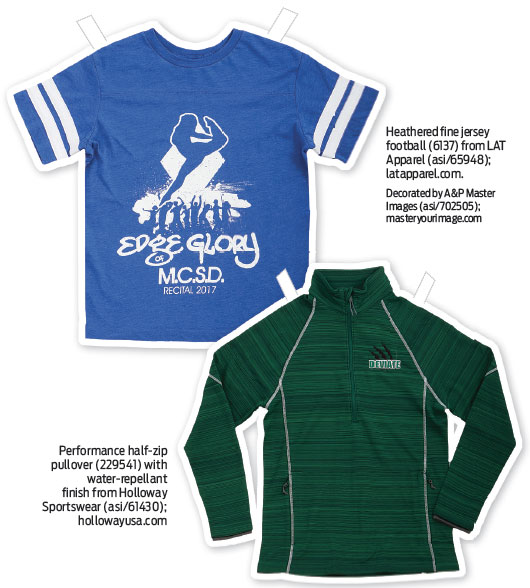
Clothing is a big deal to this demographic. According to the NPD Group, apparel accounts for the largest share of back-to-school spending for students from kindergarten through 12th grade, with 60% of consumers reporting more spending this year than 2016. The National Retail Federation also reports that college students spent about $8 billion on clothing when heading back to campus this fall.
When high school students in particular look for branded apparel – such as for their school, sports team or organization – they prefer stylish performance items, such as technical quarter-zips, half-zips and hoodies. They often have performance features and bold color accents, and they easily become an everyday style for classes, extracurriculars and spending time with friends.
“They’re white-hot right now,” says Chris Berger, CEO of Rokkitwear (asi/311331), which does 100% of its business with high school students. “Students can’t get enough of them. It’s fashion meets spiritwear. It’s no longer just a unisex hoodie with ‘Go Vikings’ across the front – now it’s a retail-quality piece with a school design you can wear every day.”
Students go for 100% polyester, cotton/polyester and polyester/spandex blends. Imprint locations (usually in embroidery, soft-hand screen printing or DTG specifically for cotton garments) are still mostly on the left chest for the former and full front in the latter two.
Berger looks for suppliers that marry fashion and technology, and also have the necessary staples to service schools, including school colors and good inventory.
Athleisure is popular on college campuses as well, though with more emphasis on the “leisure” aspect; flowy tank tops and crop tops for women and super-soft cotton T-shirts for men have been big sellers for SoBe Promos (asi/245603). “They like nice quality apparel,” says Chris Ferriter, vice president of business development. “They want a retail cut with a soft feel. We also do a lot of full-zip and loose, sleeveless hoodies that pair well with leggings.”
The popularity of tri-blends and poly/cotton blends has been flagging slightly, says Ferriter, in favor of 100% ringspun cotton with a flattering cut. “They want to be able to wear them on campus and then out that night,” he adds. “They also like black because it goes with everything, and heathers because they’re more subtle than solids.”
College students also appreciate subtlety in their imprints, such as a clear gel screenprint which creates a tone-on-tone look, says Ferriter. For more pop, full-front DTG prints in full color, along with distressed prints, are in demand.
“We do 20,000-piece stadium giveaways, new student orientations, Greek tailgates, bachelor and bachelorette parties, pretty much any type of event where college students are present,” says Ferriter. “People are coming to us asking for our suppliers by name because they’ve done their homework.”
20s and 30s
Versatile and Subtle
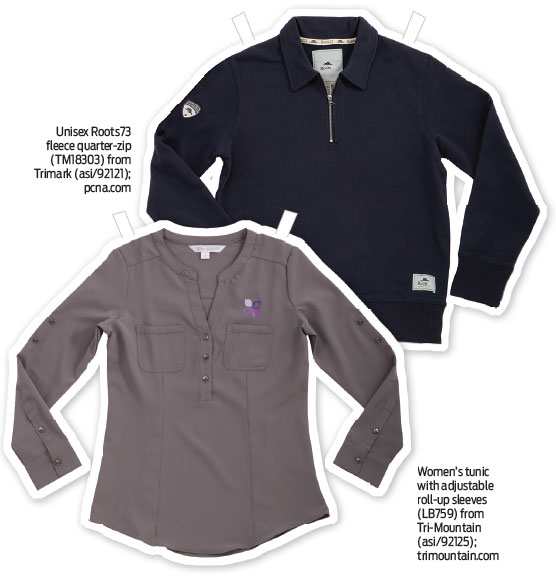
End-users in their 20s and 30s are often settling into their careers and going through major life changes, such as marriage and kids. In fact, a study by marketing platform Crowdtap recently reported that over 60 million millennials – about 80% of that group – will become parents by 2026. But they still want to look stylish and stay comfortable as life gets busier.
Whether the branded apparel they wear is from a consumer brand or an employer, “they’re looking for quality easy-care garments that can be worn different ways,” says Lien of Sunrise Identity. “They’re less worried about the actual cost and more intrigued by the retail style and fit.”
Many of the garments for this group are used for trade show booth staff, employee stores, staff retreats, sales meetings, golf outings and B2C retail. And with diverse sets of people being served, it also means women’s style needs should be accommodated. Women want specifically feminine pieces, “a fitted T-shirt, or a nicer blouse,” says Lien. “They want it to be comfortable and more feminine, and to stand out.”
Meanwhile, workplaces offer perks such as flexible work hours and casual dress codes to attract new hires from this demographic. As a result, employees want apparel that’s retail-inspired, comfortable and versatile, since they’ll wear it to work, to the gym at lunch and out to happy hour.
“We’re more comfortable now at work than we’ve ever been,” says Jill Albers, vice president of business development for Shumsky (asi/326300). “At trade shows, everyone used to be in a suit; now, it’s jeans and comfortable tops that won’t wrinkle. It’s all about the fit, quality and what’s at retail now.”
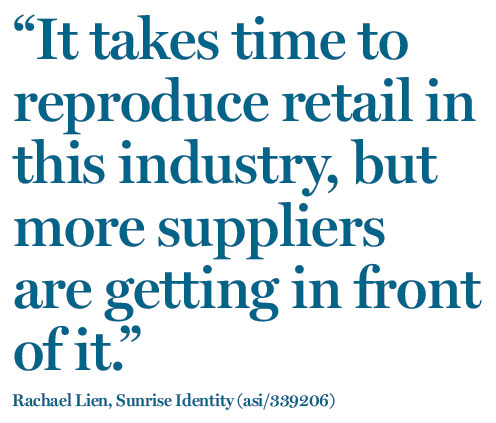
Athleisure’s versatility for both the office and personal time means it’s still a popular option for men and women. “A comfortable T-shirt, hoodie or flowy top can be easily dressed up,” says Lien. “People want a comfy lifestyle fit.”
Albers says some of the best-selling athleisure looks for women in this demographic are tunics and T-shirt dresses long enough to be worn with leggings, along with quarter-zips and V-necks with a feminine fit. They also like unisex styles (as long as it’s not a men’s companion piece afterthought) “because people want to wear what they want regardless of gender,” she explains. She adds that preferred fabric constructions are shifting to cotton with a little polyester (because it offers wrinkle resistance and quality) and super-soft hands that look worn in.
For the imprint, consider heat transfers, debossing and sublimation combined with screen-printing; smaller imprints draw attention when they’re in unexpected places, like the front placket or back shoulder. “They want different and exciting,” says Lien. “Metallic and gel inks are big, and we’ll imprint the yoke or right hip. They love the retail look.”
This age group is proud to wear the logo of brands they support, as long as it’s done well and doesn’t take away from a garment’s retail feel. “The size of the imprint can be large, as long as it doesn’t look like a tacky billboard,” says Albers. “All items should be cohesive, like a collection. They should represent the brand, not scream it.”
40s and 50s
Distinctive and Streamlined
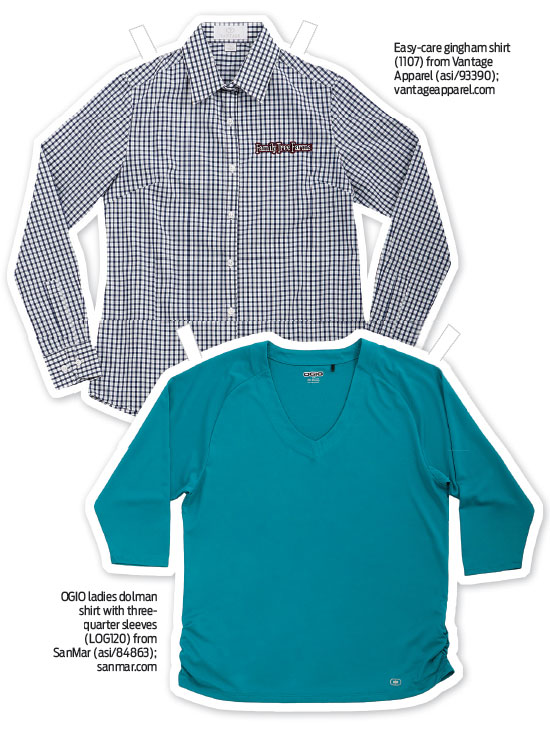
As end-users reach their 40s and 50s, they’re often moving into management roles in their careers, which means they’re also shifting to dressier styles such as button-down shirts, blouses and high-end polos. Much of the time, the apparel is destined for company stores, golf tournaments, trade shows and national sales meetings.
“There are a lot of C-suite level orders for this age range,” says Stacy Miller Scott, vice president of sales at T.R. Miller Co. (asi/272250). “Fabrics are a big focus for them. They like soft hands and items that can go from day to night, especially those that are wicking and easy-care. Brands are important too, like Cutter & Buck (asi/47965), Callaway, Under Armour, Nike and Adidas. What really sells are solid polos and dress shirts at a midline price but still good quality.”
Miller Scott says corporate orders usually include dress shirts and polo shirts in neutral colors (such as black, gray and navy) for men, while women like asymmetrical lines and wrap sweaters in heathered colors, as well as space-dyed and marled fabric.
“Women especially want things that are made for them,” says Miller Scott. “Clients ask, ‘Will these fit real women? Because if it’s a junior’s cut and three sizes too small, that’s not going to work for us.’ They look for V-necks that aren’t quite as deep as a junior’s style, and a generous cut. Wearers don’t want to show a lot of skin, but they still want style.”
While traditionally corporate looks continue to resonate with this group, there’s also demand for athleisure styles. “People want to wear their garments through the weekend, so they can look good but stay comfortable,” says Carolyn Johnson, graphic artist and merchandiser at Eagle Promotions (asi/185320). “Those styles are usually in black, white or athletic heather, with a color accent. Men can make a statement with a mineral-washed basic crew. Inside neck taping and contrast stitching make them look like retail pieces.”
Branded garments are also quick movers in stores at hotels and resorts, says Johnson. End-users in this group often take vacations to celebrate milestone birthdays or wedding anniversaries, and they appreciate commemorative apparel. In fact, a study by luxury travel agency network Virtuoso found that this age group spends an average of $627 per day when traveling, the most of all groups studied.
“This age group is still very active and young in spirit,” says Johnson. “They want to purchase a souvenir, but they want a retail-inspired silhouette and imprint that easily fits into the rest of their wardrobe.”
Embroidery and heat transfers rule the day for this group, though in more subtle, tone-on-tone colors, and the locations can vary. While men still go for the left chest (about 75% for this age group, says Miller Scott), women like low on the hip, either in front or on the back, or the top of the shoulder.
60s and Above
Flattering and Fashionable
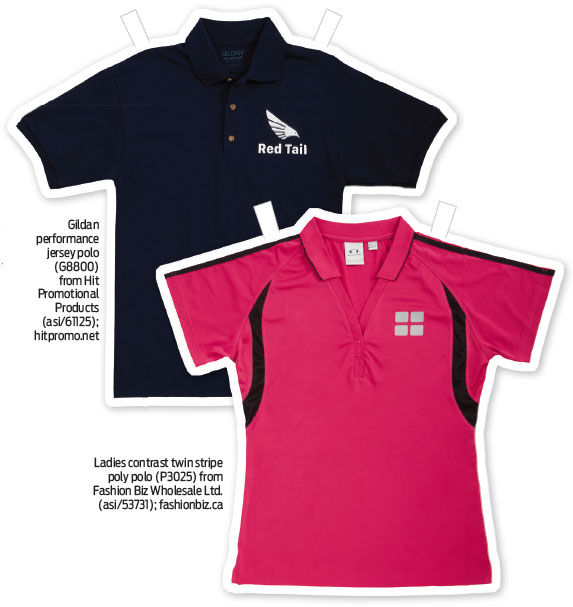
Sixty really is the new 40 – according to the national Aging Confidence Survey by the American Association of Retired Persons (AARP), 67% of respondents ages 60 and over are “satisfied” or “very satisfied” with their lives, the highest percentage among all the age groups studied. Additionally, 57% of those respondents reported feeling “younger than I am,” although 68% said their group remains “underserved” in the fashion industry.
“People take care of themselves more now,” says Robin Richter, president of Wearable Imaging (asi/356030). “Women especially in this age range will wear something that a 40-year-old would wear. They don’t want to look their age. They still want to be themselves and create their own style.”
They also still lead busy lives, both professional and personal, which means they look for garments that will keep up with them. “This age group really goes for function rather than a lot of flash,” says Score Promotions’ Rachel Wach. “And everyone wants easy-care items, because they’re still active and they’re still concerned with retail fashion.”
Popular styles include T-shirts, polos, quarter-zips and long-sleeve sweaters, often intended for trade shows, uniform programs and golf tournaments. Richter says she uses suppliers that make product sourcing easy, often displaying complementary styles with a product. “That’s great for a diverse group of people. Women don’t want to wear a men’s shirt.”

Cotton and cotton/polyester blends are more breathable than polyester, while wicking fabric constructions, cooling technology and antimicrobial treatments are perfect for busy work days. “They want to be able to leave a trade show and go right out to dinner with clients, because their work day doesn’t end at 5:00,” says Wach.
For a fit that flatters a number of body types, particularly among a group of women, Richter recommends a blend that includes spandex, which offers more stretch and additional movement. “I always look for at least 5%,” she says. “If there’s no fit, it can look like a tent. If the men are larger, I won’t recommend a performance T-shirt or wicking polo because they’re thinner. They tend to lean more toward 100% cotton.”
While women like bright colors, such as fuchsia, bright pink, purple and coral, men stick with black and navy, says Wach. “They’re also brand-driven, so they like Nike and Adidas, which always have new patterns, cuts and necklines,” she says. “Clients have also been asking again for women’s sleeveless polos, as well as sweaters and cardigans in wool blends.”
For imprinting, this demographic still prefers the left chest. “Occasionally, we’ll put it on the sleeve, like if the brand logo is already on the chest,” says Wach. “But no hem tags or anything on the back of collar. These styles often have a high perceived value, so they’ll go for embroidery.”
Sara Lavenduski is the senior editor for Advantages. Tweet: @SaraLav_ASI. Contact: slavenduski@asicentral.com

Product Hub
Find the latest in quality products, must-know trends and fresh ideas for upcoming end-buyer campaigns.